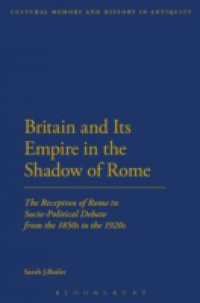Drawing on new primary source evidence, this volume evaluates ancient Rome's influence on an English intellectual tradition from the 1850s to the 1920s as politicians, scientists, economists and social reformers addressed three fundamental debates of the period - Empire, Nation, and City. These debates emerged as a result of political, economic and social change both in the Empire and Britain, and coalesced around issues of degeneracy, morality, and community. As ideas of political freedom were subsumed by ideas of civilization, best preserved by technocratic governance, the political and historical focus on Republican Rome was gradually displaced by interest in the Imperial period of the Roman emperors. Moreover, as the spectre of the British Empire and Nation in decline increased towards the turn of the nineteenth century, the reception of Imperial Rome itself was transformed. By the 1920s, following the end of World War I, Imperial Rome was conjured into a new framework echoing that of the British Empire and appealing to the surging nationalistic mood.

